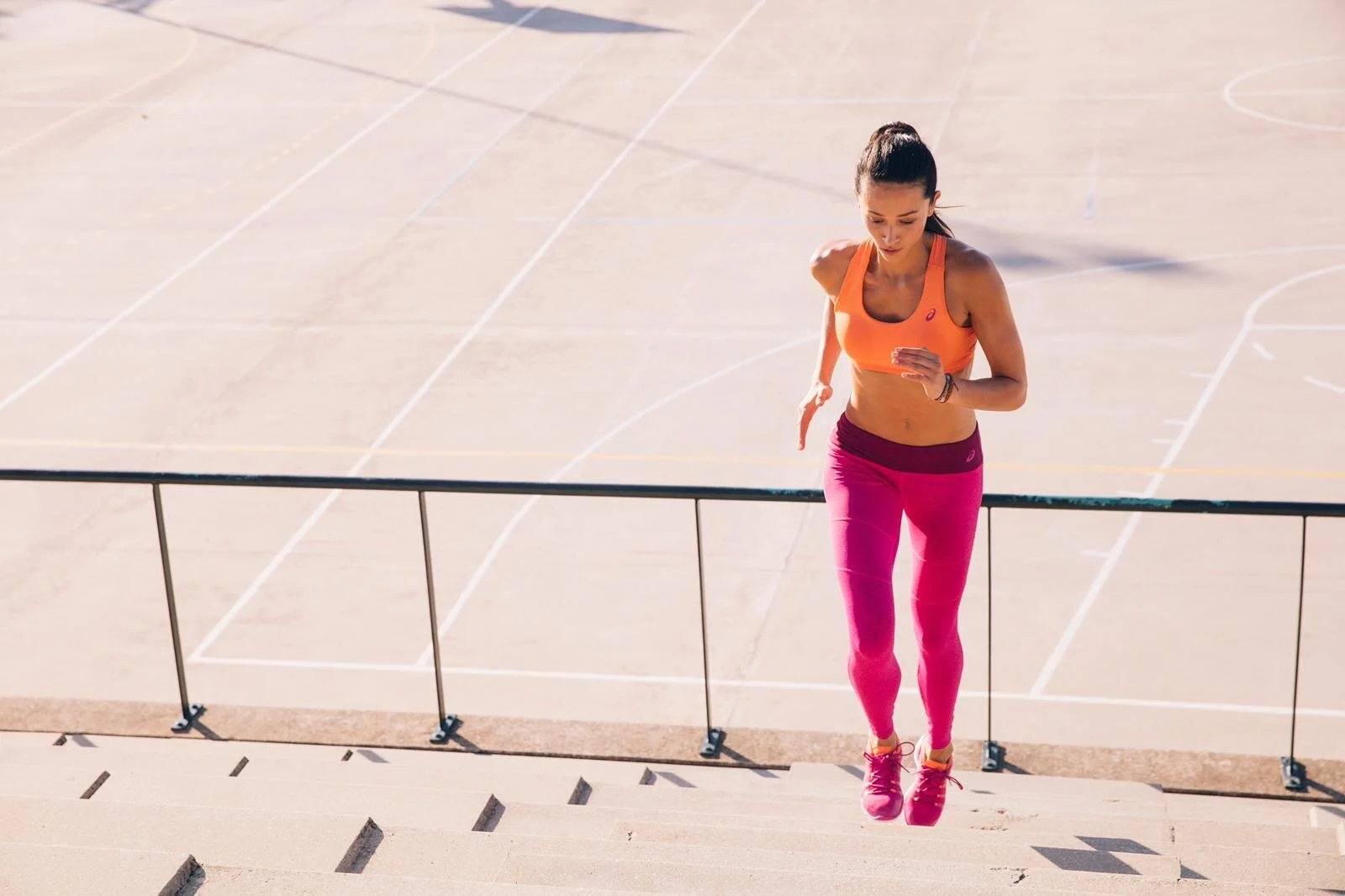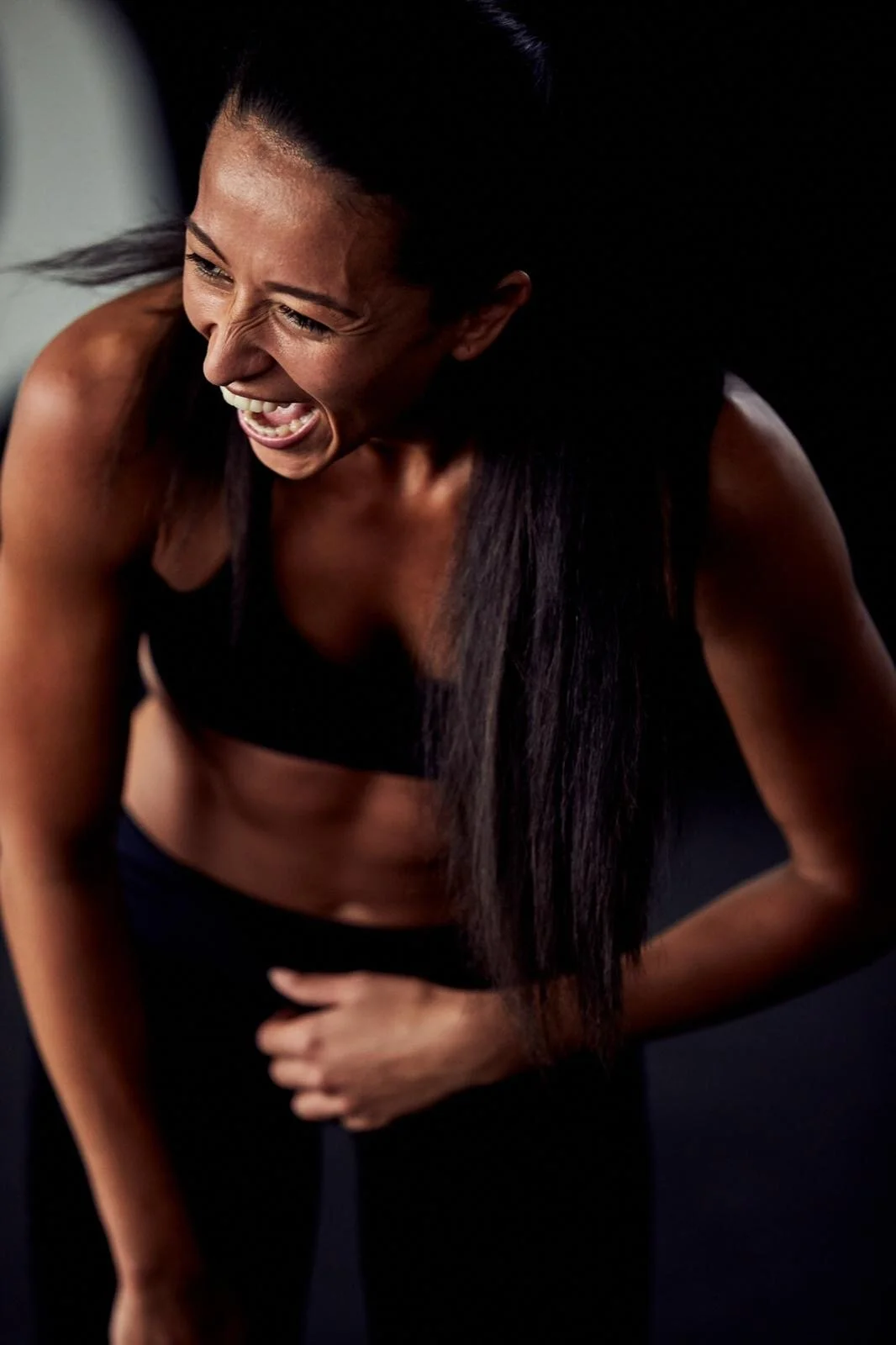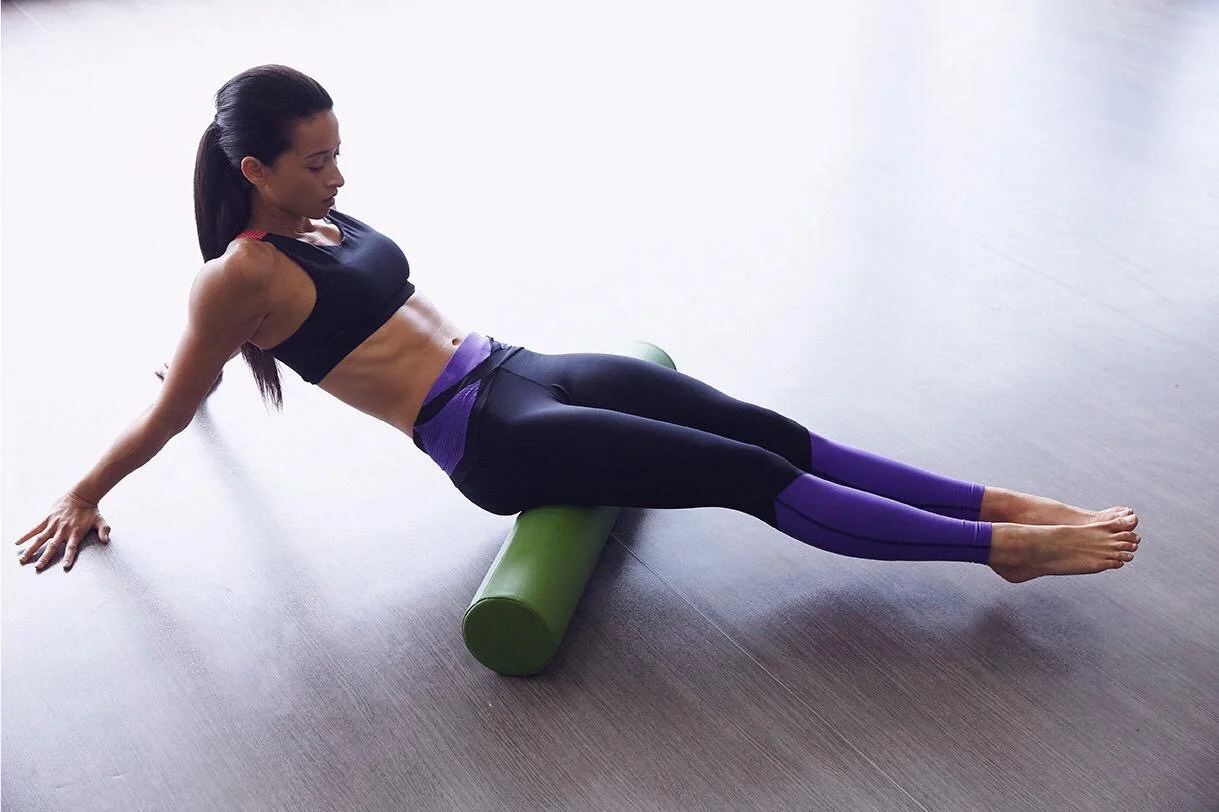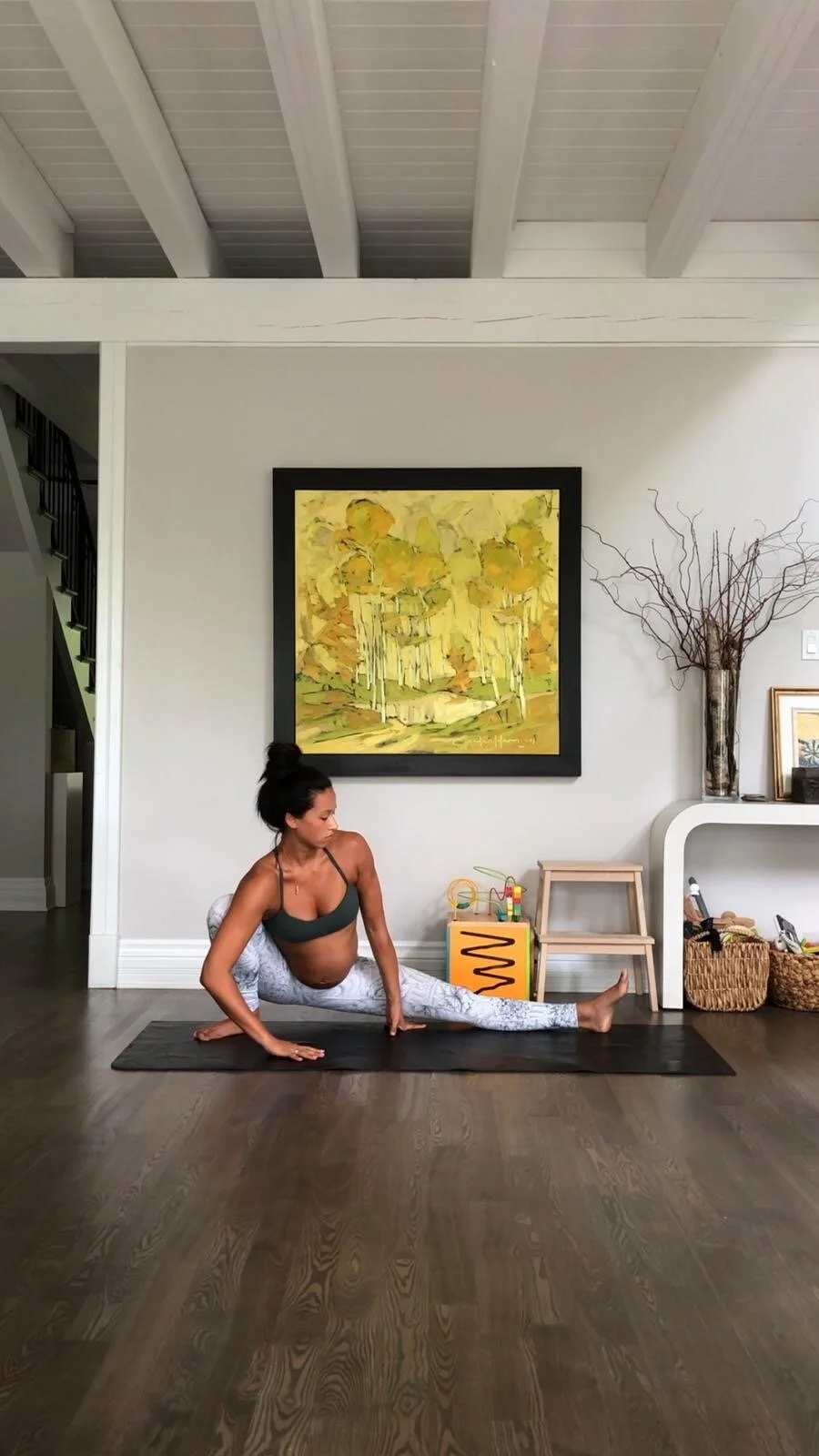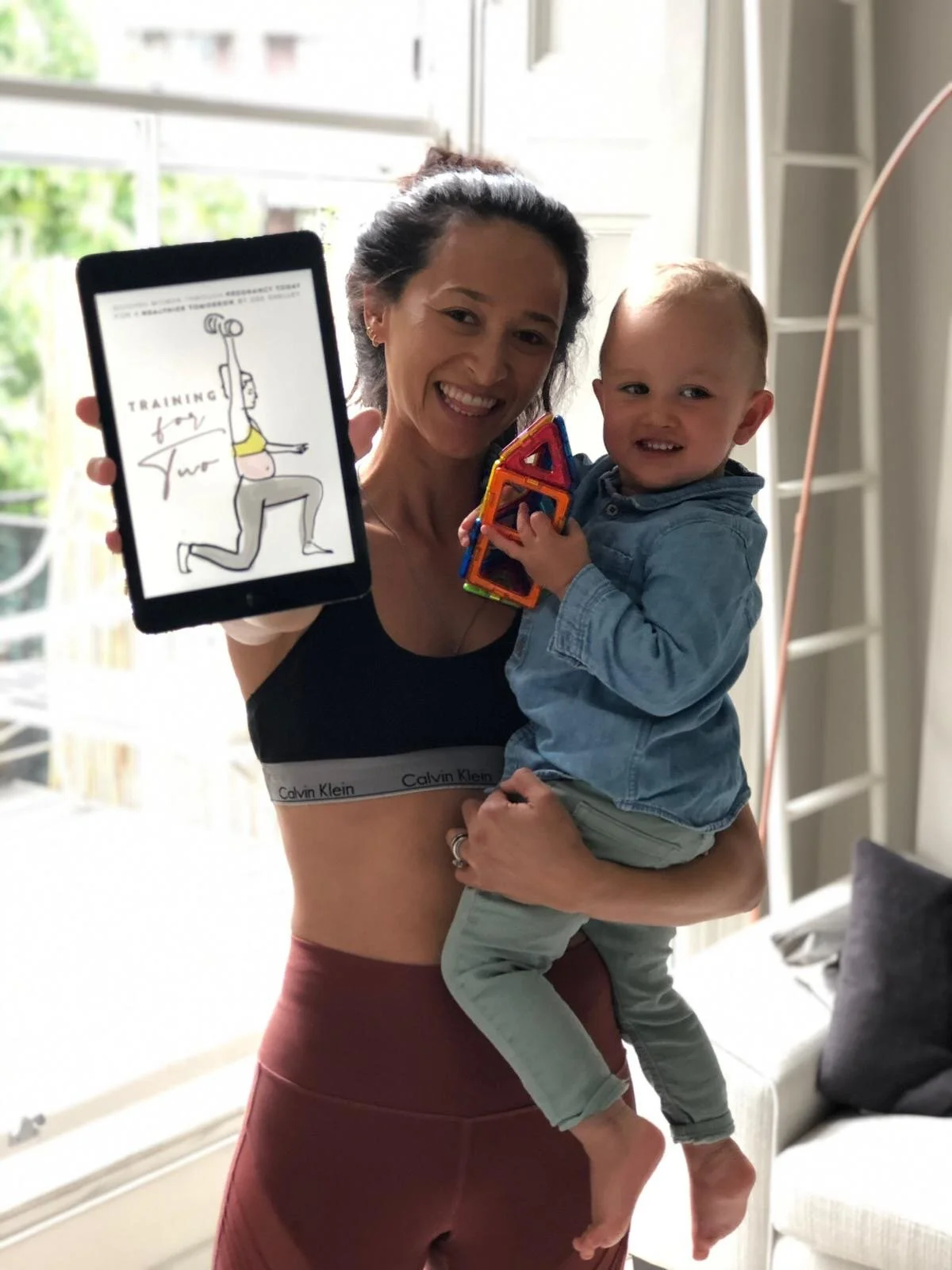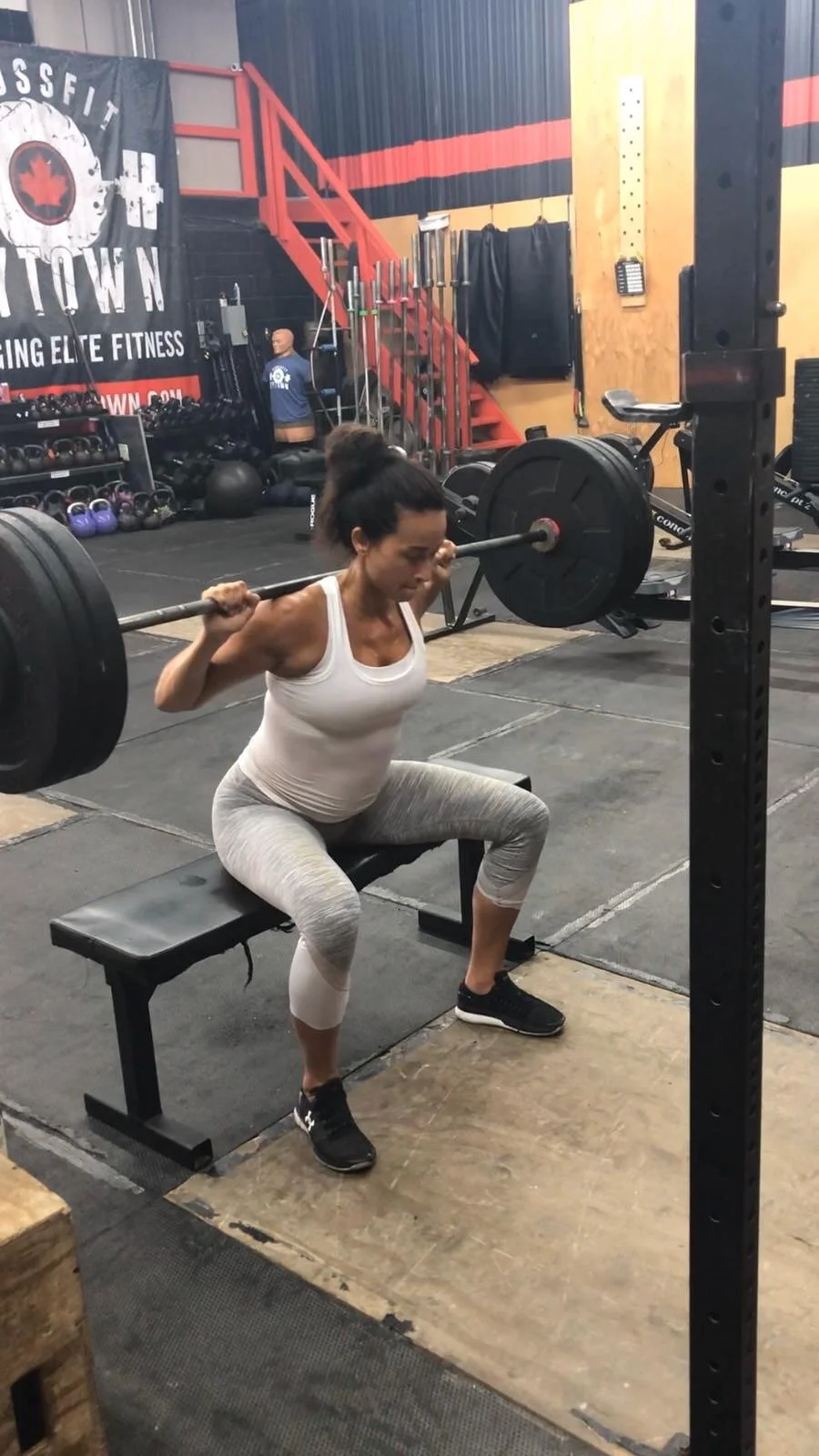Profile No. 4: Zoe
Zoe Shelley is an absolute portrait of what the ideal trainer and fitness advocate should be: She is an extremely conscientious and thoughtful teacher who truly listens to her clients goals and individual body needs. She completely lights up a room with her positive attitude and cracks up everyone around her with clever English wit. Not to mention her face has been seen across Europe due to her successful modeling career, partnering with high-end brands like Asics and Adidas, and being on the cover of fitness magazines. Zoe and I met on Wonder Woman in 2016 and have maintained a close friendship after working together for a full year.
I get really tunnel vision about things and am very bad at doing anything else at the same time. So when I got pregnant I was INTO my pregnancy. I already had a basic pre and post natal training qualification (which I soon learned was insufficient in my opinion) but the more I got into the subject and was practicing what I was preaching, it became very apparent that there is this huge hole of knowledge - particularly in the fitness industry - about women’s bodies and pregnancy. The most important things women should know about their bodies, they don’t! Women’s health in general, as far as mainstream knowledge goes, is lacking - in school we are taught about our periods and that’s pretty much it, then it just stops...
In 2018 Zoe became pregnant for the first time, and her platform took on a new perspective. As she started researching and reading all the baby books like every new mum is meant too, she quickly realized how significant information is seriously misleading or just - missing. This evolved into Zoe writing a pregnancy guide that was launched in May this year, Training For Two. The chapters cover all stages of pregnancy, truths about exercising while pregnant and early postpartum, vital breathing and core techniques to protect Mum’s body from long term core and pelvic floor issues, and an intimate look into her experience as a first time pregnant woman. Her words on the subject ooze with enthusiasm as she explains to me why she started writing it, who she was writing it for, and the idea that this is only the tip of the iceberg...
Yes you are absolutely right!
The true basics on what happens to your body pre and post natal, is not easily accessible. Unless you really seek it out, but you have to really dig. Other than that you have to learn it on the fly, if at all. So I thought… Why can’t I do my part to plug that hole a little…
And just to clarify… Pre is before pregnancy? Clearly I’m a first timer!
Prenatal is before birth {everything during pregnancy} and postnatal is after birth. Some countries use slightly different terms... But even this! Shouldn’t we all know this as basic women’s health education?!
Yes! Well I think the sex-education we receive in school is so outdated - but that’s probably a different conversation… Sex-ed and the nitty-gritty of women’s health is thought of to be very taboo, so we are trained to not talk about it. When I was a dance teacher I had students ask me questions because they thought it wasn’t appropriate to ask their sex-ed teachers or parents!
When you started your research, what were you finding and what were you not finding?
I was finding that yes there are niche groups of people doing amazing work in this area - doctors, physios and coaches - and many of them have been my teachers. But that mainstream awareness of what is going on with a woman’s body during and after pregnancy is distinctly lacking. The typical places a woman might go for information about her body and exercise during this time - online articles, newspapers, apps, social media - they offer very generic advice which tends to err on the ultra conservative side and without any scientific backing, they typically don’t explain the WHY of any recommendations they make, and they focus almost exclusively on the wellbeing of the baby, ignoring poor Mama’s body and the enormous stresses and strains she goes through in carrying and delivering a baby.
And of course the old wives tales are still so prevalent. “Exercise can harm your baby” is the biggest myth about pregnancy out there and it’s so loud! Not only is it not true, but it overlooks the myriad of benefits for both Mother and baby.
And there’s an ingrained problem with the fitness industry as a whole... There’s such a close knit tie with exercise and how you look. Of course body image is a factor in why the majority of people work out, and if anyone denies that I think they’d be lying to themselves, but it is increasingly perceived as the ONLY reason why people choose to work out, which is categorically untrue! And this, sadly, roles into pregnancy. Pregnant women who choose to exercise can be subject to this narrow minded attitude, and labeled narcissistic or selfish. This happened to me!
You mean people were body shaming you??
I don’t think they were shaming my body as much as they were shaming my attitude towards exercise during pregnancy, but yes this absolutely happened. Essentially the message was “how could you risk your baby’s life for the sake of your own body”. It’s so sad! And in a way, that fueled my motivation to do this, because these accusations came from people with no background of knowledge or science or anything. It was just these outdated, inherited ideas from past generations. And because of my background, I had enough conviction to ignore those comments and know what I was doing was in mine and my baby’s best interest. But it made me think about the other women out there who would try to stay active and be healthy for their baby and their bodies, and who would then be shut down, scared and stop doing what felt right because of other people’s ignorance. I hated that thought!
I love that fire! And even at the very beginning of your book you have this disclaimer, if you have these symptoms…. Which is so smart!
Yes! And honestly - most people don’t have those symptoms! Most people have healthy pregnancies. And if you have a non-problematic pregnancy, you should definitely be exercising. The actual recommended amount for pregnant women is 150 minutes of moderate intensity exercise per week - minimum. That is five sessions of thirty minutes a week to maintain and promote a healthy pregnancy for you and your baby. Most women don’t do that to begin with!
So many women worry about exercising and miscarriage, but recent research has shown no correlation between the two. Much less well known is that maternal obesity is associated with an increased risk of miscarriage, and other negative maternal and fetal outcomes, and obesity in women of child-bearing age is at an all time high! I don’t know where the message got so mixed over the years... But it goes back to education and that people just don’t know this stuff! Another reason why I wanted to write the guide.
When I started writing a lot of people got excited thinking I was writing a workout guide for pregnancy, but that’s not what I did, sorry! I’m not convinced that I can write one because everyone’s pregnancy is so different! I can’t write something for your week 20 because I don’t have a clue as to what your pregnancy looks like and how it might be completely different to someone else’s week 20. I wanted to write something that would empower women with more knowledge, because we’re not given it elsewhere. Statistically, 85% of women will have children. And for us to not know all of this is.... no good.
So you wrote this for the 85% of women who are going to have a child… Which is pretty much everybody!
Well I started this out to be like a glorified FAQs - you know all the questions you might have about exercise and your body when you first find out that you’re pregnant. I wanted it to be short and sweet. But then it snowballed into what it is now because I couldn’t leave some things unsaid! In my mind I was writing for Mum’s first and foremost, but what’s in this guide is what I believe to be the absolute minimum that a personal trainer should know about the pregnant and postpartum body if they are training women from this community. Yes, pregnancy is temporary. But postpartum is literally the rest of your life. The things your body goes through means your body is changed forever. And there are considerations for that population that need to be factored in.
It seems absolutely ridiculous to me that in order to be a personal trainer you need no qualification whatsoever in pre and postnatal training. So when women seek out this “expert advice”, they are for the most part getting something very far removed from their expectations, without knowing it.
When I first started out as a trainer {without any pre or postnatal education} and was teaching classes, I would sh*t myself when a pregnant woman came to my class - because I wasn’t taught how to train them properly! I would recycle the mantra I think all new trainers are given which goes something like, “do what you’ve always done, don’t do the core stuff, take it easy and just stop when you need!” and then pray she would be okay as she’s leaving my class. Absolutely terrible advice that came from a place of trying to cover my own ass rather than serving her as a client, and yet I was technically “qualified” as an expert in fitness! So in the UK I went to get the basic Pre and Post Natal Qualification which is an add on to your PT training certificate. It didn’t really help me feel much better to be honest and I have, off my own back and because of my interest in the topic, subsequently spent years gaining further education and qualifications on this area of women’s health. Looking back at it, now I’m thinking maybe my next step needs to be going to the boards and requesting changes to update their curriculums on basic pre and post natal education for trainers....
I was thinking the same thing!
So long winded answer, but that’s another group of people that would benefit from reading this. Trainers who will inevitably be training pre and postpartum women.
“Postpartum forever”… I’ve never thought of it like that. And I love that section in your book where you dive into changes in the body that most women get after having children. I recognized some in women I had met who had two or three kids - which is not uncommon for a woman to have - I mean that is so traumatic on your body! I don’t know if traumatic is the right word —
Oh it’s definitely the right word! It is traumatic. Child birth is a car crash! There’s a certain narrative around childbirth about the miracle and magic and beauty…. - which is all true! It’s the closest thing to a miracle I’ve ever witnessed. It IS a miracle. And that’s all great - BUT - what it demands of our bodies is absolutely nuts! I was so unprepared. Throughout pregnancy your body is essentially hijacked, you have no control whatsoever, and then it culminates in having to push a relatively large baby out of a very small hole, or be cut open to get it out, and it’s so normalized!! Like, “yeah... had a baby... yep… what’s next”. Even though I had a relatively straightforward delivery, I still had to be carried by two people into the bathroom and maneuvered into the shower because I couldn’t move after giving birth. Not prepared for any of it, not even remotely.
Now again, the fitness industry. “OK you just had a baby eight weeks ago. Let’s crack on then! How about some HIIT?” NO! Absolutely not! The trainer has to understand what just happened to this woman’s body! There are so many factors that need to be taken into account and questions that need to be asked - is she sleeping, is she breastfeeding, is she leaking, does she have any pain, how is she standing and sitting, how is she moving, how is she breathing, what is her core doing? If we don’t factor these things in to how a postpartum woman approaches exercise she can unintentionally aggravate issues and set herself up for a much longer recovery.
Potential problems from pregnancy and childbirth can crop up years, even decades after the event - that’s one of the reasons why postpartum is considered “forever” - and the likelihood of certain issues occurring is directly related to our behaviors and tendencies both inside and outside of the gym in the years preceding, and over the course of, pregnancy and postpartum. We don’t know what we don’t know, until we know!
I’ve noticed that celebrities sometimes come forward to talk about Postpartum Depression (Reese Witherspoon, Serena Williams, etc.). But other than that I feel like I don’t know anything about it… But it’s clearly something very serious —
Like any problem - it is all rooted in the history. In the 18th century pregnancy was considered a sickness. You were “sick” for nine months. Around that time, doctors were obsessed with pre-natal influence, which was the idea that if the Mother saw or heard something disturbing - think bad smells or the sound of a gun firing - it could cause severe distress to the fetus. So pregnant women would often shut themselves away and not do anything, just to be safe. In the Victorian era it was fashionable for women to be frail and delicate, and to show a pregnant body in public was frowned upon. These ideas that the details of pregnancy are somewhat unsavory and taboo, and that to speak out could result in derision or shame have filtered down through the ages, and we still find ourselves influenced by them today.
Many women feel unable to speak up about what happens to them for fear of embarrassment, or to be told to settle down because what they are experiencing is a “normal” part of motherhood. Many conditions arising from pregnancy and childbirth may be common but are not NORMAL, this applies to both physical and mental health, and women need more education on how to better deal with them. Part of the solution is absolutely getting up and talking about our experiences, as you mentioned some celebrities do about postnatal depression. In my guide, which deals with the physical side of things more than the mental, and on social media, I talk openly about experiencing incontinence {leaking urine} during and after pregnancy. 1 in 3 women suffer from it and around 50% don’t ever seek help for it, but help is available and in the large majority of cases it is easily resolved! And there is work that can be done, which I touch on in my guide, to try and prevent it from happening in the first place.
At the end of your book you ask for your readers to reach out with comments and questions as to help you possibly start a second book. Any ideas of what that could be?
I think this “book” or “guide” is the introduction to what is a vast topic. There’s so much to explore. Perhaps the second book is putting this in the context of a work out guide... Even though I'm still hesitant - it can be done! I just need to further explore how to best serve everybody.
Training For Two was such a joy to read, because to Zoe’s point, it made me feel empowered. I gained more knowledge from reading this than I had in my accumulated years of being an adult. For mothers-to-be or present-day-mamas, this book is filled with vital information, supported by easy-to-follow videos of simple exercises that are designed to be implemented into your every day life for the long term health of you and your baby.
Learn more about Zoe’s book HERE
Follow Zoe on Instagram
Zoe is born and raised UK, who lives between London, UK and Ottawa, Canada with her husband, Alex.

